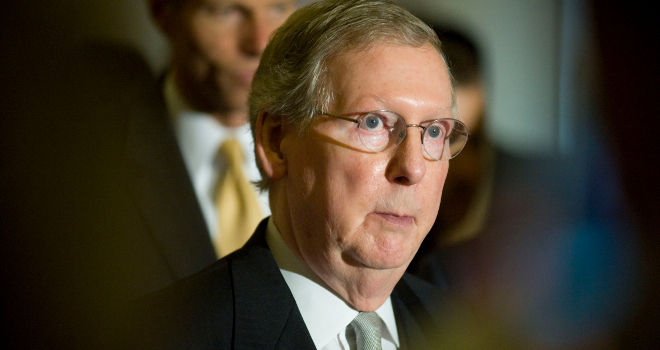We still don’t know if there’s going to be a deal today. We still don’t know exactly what it will be if there is one. And for all this frantic bustling, we don’t know if the House will pass it. [I wrote this before the House GOP signaled they don’t want to vote today at all.] But for all that, we seem to be getting a relatively clear read on the outlines of a deal. And over the course of the day I’ve gotten a better understanding of why the White House thinks this represents a strong deal for them.
The big thing that’s sticking in the collective craws of many progressives is moving the top rate from $200k/$250k to $400k/$450k for individuals/joint filers. I said on Twitter earlier this morning that that sounded to me like a mistake too. Most other sweeteners are temporary. But rates are permanent, if not quite forever. And you’re never going to get a better chance to pick your price point, for lack of a better word, than now when they’re defaulting back to the Clinton-era rates. So permanent concessions that will be quite difficult to reclaim in exchange for temporary gains.
That said, the difference between putting the top rate at those two different points amounts to something on the order of $90 billion dollars over ten years. So this presumed deal gets you just over $600 billion in new revenue and keeping the rates at $200k/$250k would have gotten just under $700 billion over 10 years.
The White House believes it was more important to keep the top rate at 39.6% for the mega rich than to worry about exactly which income level they kicked in at. They also make the more practical point that there was always significant resistance among Senate Democrats to going back to the $200k/$250k threshold. And it’s worth noting that Sen. Schumer and others routinely bumped this number up to $500k or even $1 million during earlier debates.
Make of it what you will. I think it represents a significant concession but the actual amount of lost revenues is a bit less than I had assumed.
Then there’s a substantial loss of potential revenue in a fairly lopsided compromise on the estate tax, which is described pretty well here. Folks at the White House only make a passing effort at spinning this. This comes down to a few red state Dem senators, though it’s worth noting that the estate tax, unlike higher income tax rates for high income earners, is simply not popular.
On top of this, the presumed plan includes a lot of what I call RPS, ‘Real People Stuff’. There’s an extension of Unemployment Insurance and a five year extension of various Stimulus Bill-era refundable tax credits and pay-outs focused on low and middle income people or businesses that employ them These are tangible in terms of the lives of a lot of people and they also have a stimulative effect in what remains and will continue to be a bruised economy.
All of this goes to say that on its own terms, this isn’t a bad deal at all, if you accept that some give and take was necessary.
My take goes back to something I’ve been thinking about for the last month. The President says he will under no circumstances negotiate with congressional Republicans over a new debt limit extension. Not under any circumstances. I believe he means it, even feels passionately about it. But this is considerably more difficult to do in practice than to pledge. And while I believe the White House is committed to this refusal to negotiate — basically no negotiating with hostage takers — I’ve never been clear on just what the game plan is or just how they see a hostage taking scenario playing out.
There’s no escape valve. They don’t think the so-called ’14th amendment solution’ is either constitutional or viable in practice. So you have to assume that either congressional Republicans simply don’t try it, cave after trying it or that you tumble into some mix of massive government shutdown and/or default.
Why does this matter? Because the snap-back of the Clinton-era tax rates was the big cudgel the White House held over the Congressional GOP. And this basically closes the books on the tax rates issue. So, on its own terms, this deal looks relatively decent. But if it means the President has to concede to massive cuts to Medicare and Social Security or other critical spending in a month or two because he now lacks critical leverage then it would be a pretty bad deal indeed.
So, decent deal but with a massive asterisk. And we may not know what that asterisk means until February.









